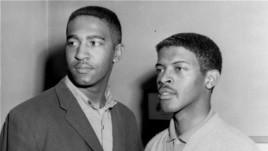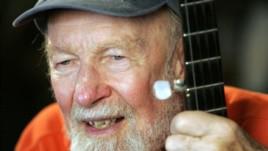VOA慢速英语:Remembering a Civil Rights Hero and His Powerful Protest
From VOA Learning English, this is As It Is. I'm Caty Weaver.
Today on the show we remember two important Americans, both activists in the cause of civil rights.
Franklin McCain launched a successful protest in Greensboro, North Carolina on February 1, 1960. It made popular demonstrations called sit-ins. And it was instrumental in the effort to pass a civil rights law.
Pete Seeger was America's most famous folk musician. But he also was active in civil rights, anti-war and other social-political issues.
Franklin McCain and Pete Seeger, their lives and work: our subject today on As It Is.
Remembering A Civil Rights Hero
Franklin McCain made civil rights history with his friends Joseph McNeil, David Richmond and Jabreel Khazan, who was known then as Ezell Blair Jr. The four men are remembered now as the Greensboro Four. But in 1960, they were students at the North Carolina Agriculture and Technical College.
On February 1, 1960, the four young men met in front of the school library. They prayed together. Then they walked into town. The night before they had decided to take action to end racial separation.

Franklin McCain and David Richmond in April 1960.
At Franklin McCain's suggestion, the students planned to order a meal at the "whites only" restaurant at the local FW Woolworth's store. Most eateries in the southern United States barred African-Americans from eating with whites.
The students knew what they planned was dangerous. They grew up in a time of violent opposition to the 1954 Supreme Court decision to end racial separation in public schools.
The friends promised each other that they would sit at the Woolworth lunch counter even if they were attacked. When they arrived at the store, they bought school supplies. Then, they walked to the eating area and sat down together.
Restaurant workers ordered Franklin McCain and his friends to leave. People in other parts of the store stopped to watch.
The police came but did not arrest the students that day. The young men sat at the lunch counter until the store closed.
The next day, they returned. The number of student protesters grew each day. They came from both black and white schools. Soon the protesters were holding sit-ins at other restaurants in Greensboro.

Lunch counter and stools that the four protesters sat on in Greensboro, North Carolina.
The Greensboro protests launched a sit-in movement that spread across the southern United States. Within 10 days, students in 13 states had organized lunch counter sit-ins in 55 cities.
In the summer of 1960, Woolworth agreed to end separate eating areas in its Greensboro store. Today visitors to Greensboro will find a road named for the day the sit-ins began. February One Street is in the center of town. It leads to Elm Street, where the old Woolworth building is now home to the International Civil Rights Center and Museum.
Franklin McCain was 19 years old when he launched the sit-in that helped change the South. In the years that followed the Greensboro Sit-in, reporters and researchers often asked McCain if he had been afraid that day. He always answered that he had grown tired of being afraid. He felt angry. He said when he finally sat at the lunch counter he felt very calm and powerful.
The protests and other events led to the Civil Rights Act in 1964 and the Voting Rights Act in 1965.
Remembering an Activist-Artist
Pete Seeger, the famous banjo-playing folk singer and songwriter died Monday at the age of 94. Pete Seeger made American folk music popular. He also fought for social change. VOA's Katherine Cole remembers his career.

Folk singer Pete Seeger performing in New York City in 1975.
For many, Pete Seeger will be remembered as America's most famous folk singer. He grew up believing that song has the power to change the world. As a young man in 1938, Pete Seeger left Harvard College in Massachusetts.
In the early-1940s, Seeger formed The Almanac Singers. The singing group was known for recording songs about labor rights and against war.
Pete Seeger served in the army during World War II. After the war he formed The Weavers. The group soon became one of America's favorite singing groups.
One of the most famous recordings by The Weavers is the Hebrew language song "Tzena, Tzena, Tzena." Just five years ago, at 89, Pete Seeger re-recorded the song. The words are sung in Hebrew as well as English and Arabic. And as Pete Seeger describes it, all the parts harmonize well.
Pete Seeger also played an important part in the civil rights movement. He not only attended protests but he helped provide the movement with its anthem, "We Shall Overcome." The song was created from an old spiritual called "I'll Overcome Someday."
The words were changed over time and Seeger and other folk singers sang it at protests. Singing "We Shall Overcome" became a tradition at civil rights gatherings in the 1960s.
In 1994, then President Bill Clinton awarded the musician with Presidential Medal of the Arts, the nation's highest honor for artists. Two years later Seeger was admitted to the Rock and Roll Hall of Fame. And in 2009, he performed at the Lincoln Memorial in a concert to celebrate the presidency of Barack Obama.

Pete Seeger in 2006.
When he died, Pete Seeger had a list of honors longer than the neck on his beloved banjo. Not bad for a man who said he never meant to make music his career.
"I did not want to be a professional musician. I liked to sing, but I thought the music business was full of hypocrisy. I did, though, go sing in the schools and in summer camps. And then some of the kids grew up and went to college. And I, during the ‘frightened ‘50s' when the blacklist was in the popular music business, I just went from college to college to college to college to college to college to college."
I'm Katherine Cole.
And that's As It Is for today. I'm Caty Weaver. Thanks for joining us.
- 频道推荐
- |
- 全站推荐
- 推荐下载
- 网站推荐




















